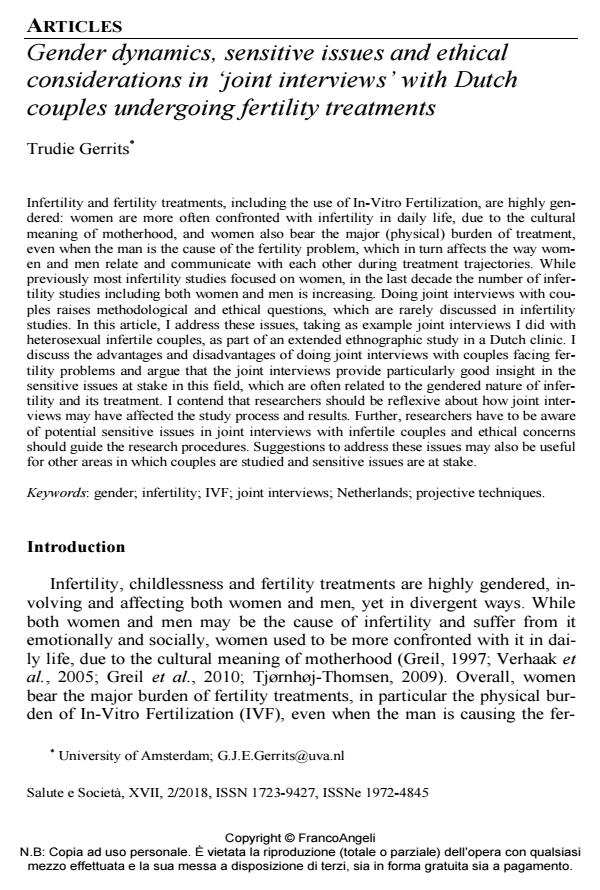Gender dynamics, sensitive issues and ethical considerations in ‘joint interviews’ with Dutch couples undergoing fertility treatments
Titolo Rivista SALUTE E SOCIETÀ
Autori/Curatori Trudie Gerrits
Anno di pubblicazione 2018 Fascicolo 2018/2
Lingua Inglese Numero pagine 18 P. 11-28 Dimensione file 87 KB
DOI 10.3280/SES2018-002002
Il DOI è il codice a barre della proprietà intellettuale: per saperne di più
clicca qui
Qui sotto puoi vedere in anteprima la prima pagina di questo articolo.
Se questo articolo ti interessa, lo puoi acquistare (e scaricare in formato pdf) seguendo le facili indicazioni per acquistare il download credit. Acquista Download Credits per scaricare questo Articolo in formato PDF

FrancoAngeli è membro della Publishers International Linking Association, Inc (PILA), associazione indipendente e non profit per facilitare (attraverso i servizi tecnologici implementati da CrossRef.org) l’accesso degli studiosi ai contenuti digitali nelle pubblicazioni professionali e scientifiche.
Infertility and fertility treatments, including the use of In-Vitro Fertilization, are highly gen-dered: women are more often confronted with infertility in daily life, due to the cultural meaning of motherhood, and women also bear the major (physical) burden of treatment, even when the man is the cause of the fertility problem, which in turn affects the way women and men relate and communicate with each other during treatment trajectories. While previously most infertility studies focused on women, in the last decade the number of infertility studies including both women and men is increasing. Doing joint interviews with couples raises methodological and ethical questions, which are rarely discussed in infertility studies. In this article, I address these issues, taking as example joint interviews I did with heterosexual infertile couples, as part of an extended ethnographic study in a Dutch clinic. I discuss the advantages and disadvantages of doing joint interviews with couples facing fertility problems and argue that the joint interviews provide particularly good insight in the sensitive issues at stake in this field, which are often related to the gendered nature of infertility and its treatment. I contend that researchers should be reflexive about how joint interviews may have affected the study process and results. Further, researchers have to be aware of potential sensitive issues in joint interviews with infertile couples and ethical concerns should guide the research procedures. Suggestions to address these issues may also be useful for other areas in which couples are studied and sensitive issues are at stake.
Parole chiave:Gender; infertility; IVF; joint interviews; Netherlands; projective techniques.
- Collective Biologies pp.52 (ISBN:978-1-4780-2217-6)
- Collective Biologies pp.181 (ISBN:978-1-4780-2217-6)
- Collective Biologies pp.1 (ISBN:978-1-4780-2217-6)
- Collective Biologies pp.189 (ISBN:978-1-4780-2217-6)
- Perspectives of preimplantation genetic testing patients in Belgium on the ethics of polygenic embryo screening Maria Siermann, Joris R. Vermeesch, Taneli Raivio, Arne Vanhie, Karen Peeraer, Olga Tšuiko, Pascal Borry, in Reproductive BioMedicine Online 104294/2024 pp.104294
DOI: 10.1016/j.rbmo.2024.104294 - Collective Biologies pp.81 (ISBN:978-1-4780-2217-6)
- Collective Biologies pp.155 (ISBN:978-1-4780-2217-6)
- ‘Doing’ kinship: heterosexual parents’ experiences of non-genetic parenthood through donor conception Maria Siermann, Marja Visser, Anne Schrijvers, Monique Mochtar, Trudie Gerrits, in Reproductive BioMedicine Online /2023 pp.210
DOI: 10.1016/j.rbmo.2022.09.006 - Collective Biologies pp.35 (ISBN:978-1-4780-2217-6)
- Collective Biologies pp.130 (ISBN:978-1-4780-2217-6)
- Collective Biologies pp.106 (ISBN:978-1-4780-2217-6)
Trudie Gerrits, Gender dynamics, sensitive issues and ethical considerations in ‘joint interviews’ with Dutch couples undergoing fertility treatments in "SALUTE E SOCIETÀ" 2/2018, pp 11-28, DOI: 10.3280/SES2018-002002